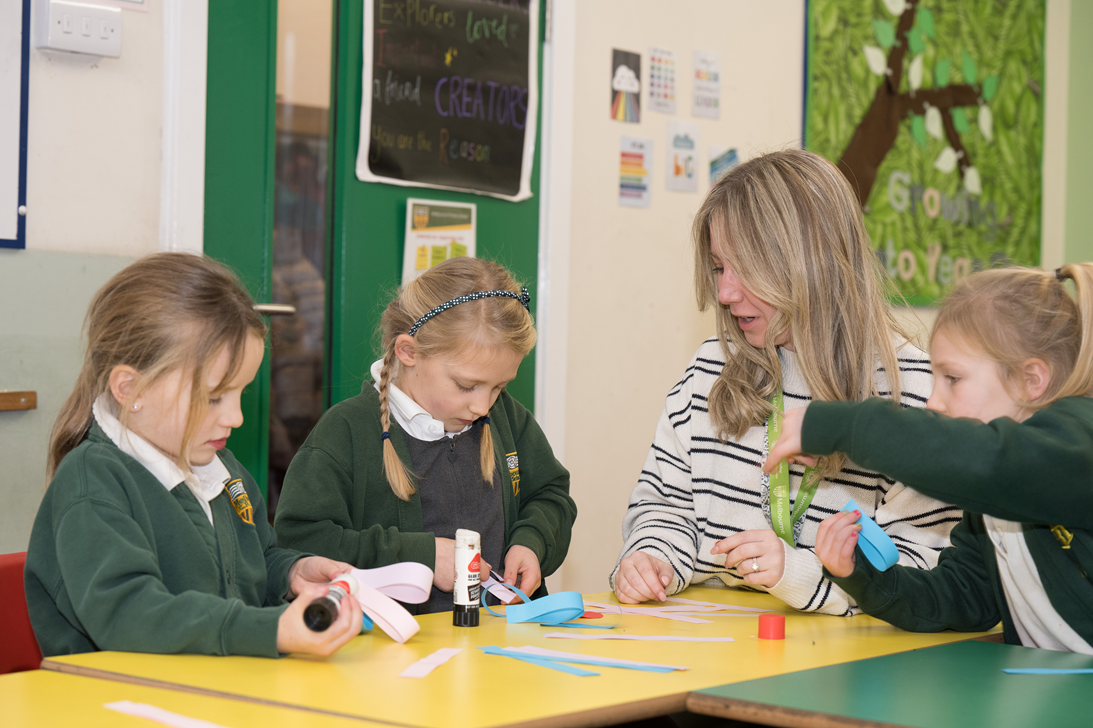At Melbourne Primary School, we provide a progressive skills and knowledge-based curriculum which is designed to contextualise children’s learning so that they learn from real life, fostering a spirit of enquiry and purpose – situating learning in our local environment, making is challenging, memorable and purposeful. Through careful design, we have ensured that pupils can revisit skills, applying them in different contexts and embedding learning.
For more detailed information, please refer to our individual curriculum pages hosted on our Wonder Learning Partnership Trust’s site:
Primary Curriculum | Wonder Learning Partnership (wlp.education)
We also use a suite of learning programmes for which you can find the links in the Useful Links & Documents section below.
Our five core values are the golden thread running through our curriculum:
Care
Through the careful design of our curriculum and deployment of adults around school, we aim to equip our pupils with skills to not only care for their own work, mind and bodies, but empower them to care for and value each other while celebrating diversity. Pupils work collaboratively, take pride in their class and community as well as celebrate the achievement of others and themselves.
Imagine
We aim to evoke children’s appreciation of their individuality, encourage them to be imaginative and inquisitive learners and inspire while being inspired. We aim to achieve this through planning interactive units of learning with rationale and purpose. Teachers cultivate and nurture children’s learning, captivating and developing spirit of enquiry.
Believe
Our pupils are nurtured and encouraged to believe in their ability when working towards their goals. They show their ambition through having an ‘I can’ attitude, aiming high and persevering when challenged. We will support and guide the development of transferable thinking strategies across the curriculum so that children can confidently take initiative, solve problems and reflect on their learning.
Strive
By modelling and sharing good practice, providing limitless challenge and supporting pupils in a safe and stimulating learning environment, we inspire all to have the ambition to achieve their full potential. We encourage children to take risks, share success and challenges, and to respect the opinions of others. They are equipped with the skills to reflect and success in different ways thus developing their own views and the skills to take responsibility for their own learning.
Achieve
We seek to promote, develop and nurture all children’s talents in a culture of ambition, high achievement and expectation. Teachers know their children well and plan lessons that build on pupil’s prior knowledge and enable them to reach their next stage of learning. Achievement is celebrated and shared and we take pride in all we do.
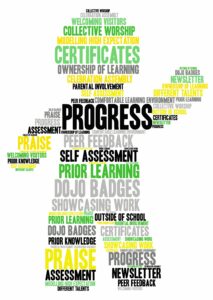
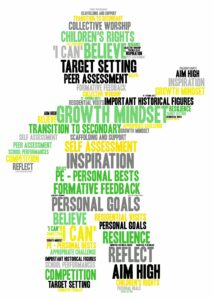
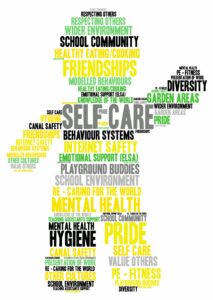
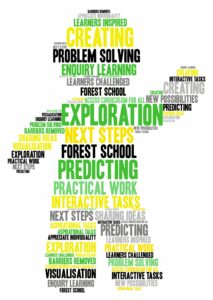
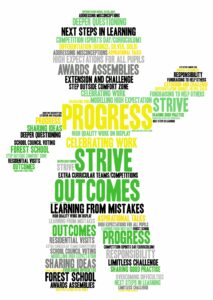
Untaught Curriculum
We place equal value and emphasis on the untaught aspects of the curriculum and the values and experiences we provide for our pupils which stretch beyond those outlined in the national curriculum. These experiences aim to supplement the curriculum as well as immerse pupils in their learning and bring their learning to life.
Curriculum Overviews
Autumn
We aim to create a love of reading through encouraging reading at home and working closely with parents to do this is vital. In order to foster a love of reading across various genres, we aim to expose children to a wide range of texts and stock our library accordingly.
Reading Learning Journey
In Nursery Years we share 15 minutes of high quality poems or stories and learning action rhymes. Activities focus on listening, attention and oral blending of words.
In Reception and Year 1 we have 20-30 minutes of reading with emphasis on fluency and accuracy with both reading and spelling. There are also 3 practice reading sessions with daily catch ups for those who need it.
From Year 2, once pupils are no longer reliant on phonics to decode words and are able to read fluently, through to Year 6, pupils are taught reading during daily Whole Class Reading (WCR) lessons. These lessons are held at the beginning f each day and last 30 minutes for Key Stage 1 and 40-45 minutes for Key Stage 2.
How are skills taught?

We use the VIPERS framework to teach reading skills comprehensively. VIPERS stands for Vocabulary, Inference, Predict, Explain, Retrieval, and Summarise. These key components help our students not only understand the text but also analyse and interpret it at a deeper level.
Whole Class Reading Lessons
Monday – class novel: each class has a novel to study which they discuss and use to complete other work in the curriculum.
Tuesday – Thursday – Linked Extracts: We build in other curriculum activities linked to the text, such as, environment links and history links.
Throughout the week, pupils will also complete independent comprehension work in order to apply their learnt skills, independently.
Supporting Readers
We prioritise reading and the support of pupils catching up with their peers. Through careful lesson design and further support outside of reading lessons we ensure pupils are supported. More information can be found in our policy in the ‘Useful Links’ below.
Assessment
We assess reading in multiple ways:
- WCR Lessons – pupils are assessed daily against objectives covered during whole class reading lessons.
- STARs Reading Assessments – Each term KS2 (and Y2 when ready) take a test on a computer or tablet called STARs Reading. These are adaptive, multiple choice questions which help teachers to assess pupils’ progress and guide them towards appropriately challenging books to read.
- NFER Test – to help inform teacher assessments and identify gaps in learning, pupils will also complete a summative NFER reading test. These are paper assessments and will test a pupil’s ability to respond to a variety of texts using their reading skills.
- Accelerated Reader (AR) Book Quizzes – Pupils’ understanding of the book they are reading is done through AR quizzes. These are monitored to see if pupils understand their books with a pass score of 60% needed.
At Melbourne Primary School we intend to create confident writers who develop a stamina for writing throughout school. We aim for all our children to be independant writers, building on a range of skills as they work through each journey of writing.
Our learners ate challenged and encouraged to take risks and view mistakes as part of the learning process. Our learners will always set high expectations for themselves where they take pride in all aspects of learning and in everything they produce.
Our Learning Journey
- Units begin with a ‘Big question’ which is based on using writing skills for impact. e.g. ‘How can we create suspense in a detective story?’
- Pupils initially use a model text to develop an understanding of discourse and structure and this may also be referred back to throughout the unit.
- Introduction of Writing Skills through high quality extracts – Children will focus on the skills they will be applying in the unit of work and learn them through the lens of always having an impact on the reader. Pupils will always be taught WHY they are learning the skill and HOW to apply it.
- Throughout the main body of the unit of work, pupils will be exposed to a wide range of high quality extracts which model these skills including prose and poetry to develop vocabulary. These extracts act as a bank of inspiration and a reference point for their future writing.
- Pupils will write short taster draft pieces of work, imitating authors styles and applying the grammar learnt to have its desired impact on the reader. These skills will always have been modelled by the teacher inducing collaborative writing opportunities. Pupils receive feedback on this work to help support and challenge them in a low stakes environment.
- Planning of Independent Writing – Pupils will apply their learning from over the course of the unit to plan and write an independent piece based on a new stimulus.
- Edit and Improve – Children edit and improve their work independently and collaboratively checking for errors and finding ways to improve in preparation for their final draft.
- Final Draft – This is an optional stage of the process and appropriate for best work, moderations and display pieces.
Maths
https://www.topmarks.co.uk/maths-games
English Literacy
https://www.topmarks.co.uk/Search.aspx?Subject=9
https://www.phonicsplay.co.uk/
https://www.youtube.com/channel/UC7sW4j8p7k9D_qRRMUsGqyw
http://www.crickweb.co.uk/ks1literacy.html
http://www.crickweb.co.uk/ks2literacy.html
Early Years
http://www.crickweb.co.uk/Early-Years.html
https://www.topmarks.co.uk/Search.aspx?Subject=37
https://www.topmarks.co.uk/maths-games/3-5-years/counting
https://www.topmarks.co.uk/english-games/3-5-years/letters-and-sounds
https://www.bbc.co.uk/cbeebies/topics/numeracy
http://www.ictgames.com/resources.html
Science
https://www.bbc.com/bitesize/subjects/z2pfb9q
http://www.childrensuniversity.manchester.ac.uk/
PSHE
https://www.topmarks.co.uk/Search.aspx?q=pshe
RE
http://www.crickweb.co.uk/ks1re.html

